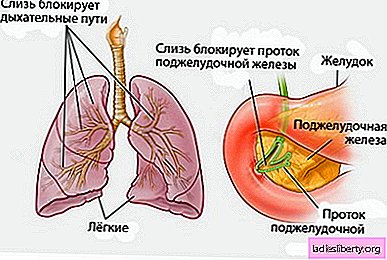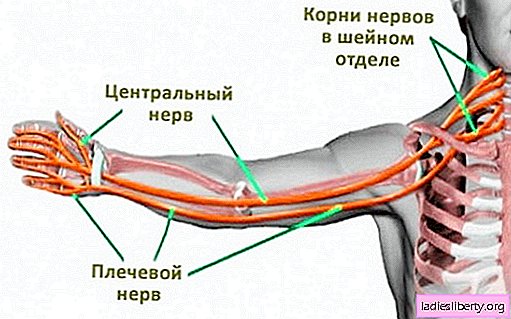
Cystic fibrosis - A genetic disease that is associated with impaired mucus production and pathology of sweat glands. The disease usually affects the lungs, intestines, pancreas, genitals, and sinuses.
In a healthy person, mucus is a specific aqueous liquid. It maintains the necessary level of moisture in the internal organs, protects them from infection or drying out. In patients with cystic fibrosis, the mucus becomes viscous and thick.
As a result, the changed mucus accumulates in the lungs and blocks the airways, which leads to the multiplication of pathogenic bacteria, which, in turn, cause various lung diseases.
In addition, mucus can become an obstacle to the movement of nutrients through the pancreas, as a result of which the body does not receive the required amount of nutrients.
Cystic fibrosis - causes
The cause of the disease is a gene called the cystic fibrosis gene (the so-called transmembrane regulator). This gene produces a protein that controls the movement of salt and water in the cell and outside the cell of the human body. In people with cystic fibrosis, the gene does not function properly, which is why the body releases very salty sweat, as well as viscous and sticky mucus.
The disease is hereditary, however, even if both parents are carriers of cystic fibrosis, there is no guarantee that the child will become ill. In 25% of cases of such conception, the child will not be a carrier of the disease and will not hurt. It is also worth noting that carriers of cystic fibrosis live a completely normal life and do not have symptoms of the disease, although they are able to pass them on to their children.
Cystic fibrosis - symptoms
Almost all symptoms of cystic fibrosis are caused by the presence of thick, sticky mucus in the patient's body. The most characteristic symptoms include:
- frequent coughing, accompanied by sputum production;
- attacks of bronchitis and pneumonia, which can cause pneumonia;
- dehydration of the body;
- salty smack of skin;
- problems with stool, diarrhea;
- good appetite for weight loss, insufficient growth.
- discomfort and pain in the stomach;
- impotence.
Cystic fibrosis can cause the following diseases and disorders: sinusitis, polyps in the nose, bronchial disease, pneumothorax (or lung damage), pancreatitis (or inflammation of the pancreas), constipation, thickening of the fingers, prolapse of the rectum, diabetes, liver disease, brittle bones and others.
Cystic fibrosis - diagnosis
First of all, the doctor learns about the diseases of relatives, after which he conducts a thorough examination of the patient.
Next, a series of tests are required to help confirm the diagnosis. Using these tests, the level of salt in sweat is measured. The doctor smears with pilocarpine (a special drug) a section of the arm above the elbow or a section of the leg. An electrode is attached to this area, which provokes sweating. This place is closed with a heat-retaining cloth or special plastic. After 30 to 40 minutes, a sweat test is taken. The procedure is repeated twice. If in both cases the salt level is high, then the person is sick with cystic fibrosis.
In addition, it is possible to carry out additional tests to make a more accurate diagnosis.
Cystic fibrosis - treatment and prevention
Since cystic fibrosis is a genetic disease, its elimination is impossible. Treatment is reduced to the suppression of specific manifestations of cystic fibrosis, as well as to their prevention.
So, for example, with lung diseases it is necessary:
- the use of antibiotics;
- physiotherapeutic treatment of the chest;
- physiotherapy exercises and physical exercises.
The focus is on the prevention of pulmonary infections, which are associated with excess mucus in the lungs. In addition, prevention of bowel obstruction is important, which boils down to good nutrition for the patient.











